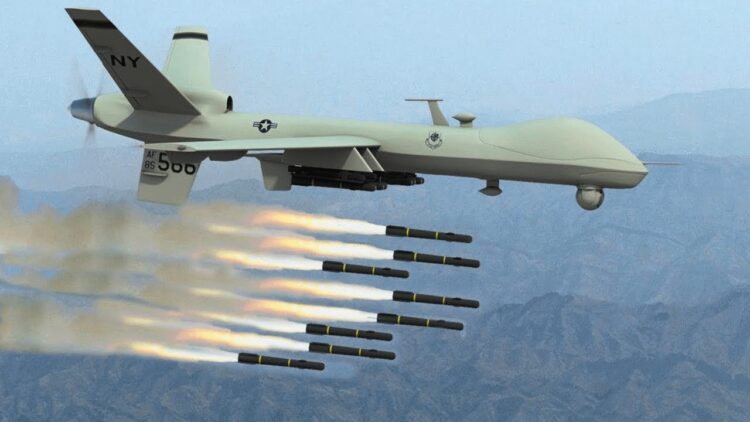DUBAI, United Arab Emirates (AP) — Yemen’s Houthi rebels announced on Tuesday that they had successfully shot down another American MQ-9 Reaper drone, as the U.S. continued its relentless bombing campaign against the group. The claimed attack on the advanced American drone adds to growing tensions in the region, with Washington ramping up its airstrikes against Houthi-controlled areas in Yemen.
U.S. Strikes Target Rebel Strongholds
The reported shootdown occurred amid a new wave of U.S. airstrikes targeting key Houthi positions, including areas around Sanaa, the rebel-held capital, and the northern province of Saada, long considered a Houthi stronghold. These attacks are part of an intensified military effort that began on March 15 in response to repeated Houthi threats to global shipping lanes in the Red Sea.
The U.S. military has acknowledged reports of the downing of a Reaper drone but has not confirmed the incident or provided further details.
Trump’s Stern Warning to the Houthis and Iran
As tensions escalated, U.S. President Donald Trump issued a sharp warning to the Houthis and their backers in Iran, stating that the rebels had been severely weakened by the American bombardment.
“Many of their Fighters and Leaders are no longer with us,” Trump wrote on his social media platform, Truth Social. “We hit them every day and night — Harder and harder. Their capabilities that threaten Shipping and the Region are rapidly being destroyed. Our attacks will continue until they are no longer a threat to Freedom of Navigation.”
Trump further emphasized that the Houthis had two options: “The choice for the Houthis is clear: Stop shooting at U.S. ships, and we will stop shooting at you. Otherwise, we have only just begun, and the real pain is yet to come, for both the Houthis and their sponsors in Iran.”
Houthis Say They Used Locally Manufactured Missile to Down Drone
The Houthis claim they shot down the MQ-9 Reaper over Marib governorate, a key battleground region that remains under the control of Yemen’s internationally recognized government.
Videos circulating on social media show flames illuminating the night sky, with a Yemeni man narrating that a drone had been hit. Later footage appeared to display wreckage resembling parts of a Reaper drone.
Houthi military spokesman Brig. Gen. Yahya Saree confirmed the attack in a recorded statement, asserting that the drone was brought down using “a suitable locally manufactured missile.”
Although the Houthis claim to have developed their own weapons, analysts suggest that the rebels have access to advanced missile technology supplied by Iran. The Iranian-made 358 missile, a known Houthi weapon, has been used in previous attacks against aircraft. While Iran denies providing direct military aid to the Houthis, UN investigations and intercepted shipments suggest otherwise.
The MQ-9 Reaper: A Costly Target for the Houthis
The MQ-9 Reaper is a high-altitude, long-endurance drone widely used by the U.S. military and intelligence agencies for surveillance and precision strikes. Each unit costs approximately $30 million and can fly for over 30 hours at altitudes exceeding 40,000 feet (12,100 meters).
The Houthis claim to have shot down at least 20 of these drones over the years, with 16 of those reportedly downed since their Red Sea attacks escalated amid the Israel-Hamas war. The U.S. military, however, has not disclosed the actual number of Reapers lost.
New Phase of U.S. Airstrikes: More Aggressive Than Before
An analysis by the Associated Press indicates that the current American military operation against the Houthis is more aggressive than past campaigns under former President Joe Biden. The U.S. has shifted its approach from targeting only missile launch sites to striking high-ranking Houthi leaders and bombing strategic locations within Yemeni cities.
The Houthis claim that at least 61 people have been killed in these strikes so far. The air raids were launched after the rebels threatened to resume attacks on “Israeli-linked” ships in retaliation for Israel’s blockade on humanitarian aid entering Gaza. However, the Houthis’ definition of “Israeli-linked” has been ambiguous, leading to the targeting of numerous international merchant vessels.
Between November 2023 and January 2024, the Houthis carried out over 100 attacks on commercial shipping, sinking two vessels and killing four sailors. They have also launched direct attacks on U.S. Navy warships, though none have successfully struck their targets.
A Strategic Gamble for the Houthis
The Houthi attacks have drawn global attention to their cause but have also triggered severe consequences. Facing economic turmoil at home and international condemnation, the rebels are now grappling with intensified U.S. military action.
Domestically, the group has tightened its grip on Yemen through crackdowns on dissidents and humanitarian aid workers. The years-long civil war has already devastated Yemen, making it the poorest nation in the Arab world, and the escalating conflict with the U.S. threatens to deepen the crisis.
With the American airstrikes showing no signs of slowing down, the Houthis are at a critical crossroads—either de-escalate their aggression in the Red Sea or risk further devastation from U.S. military firepower.

 English
English



























































